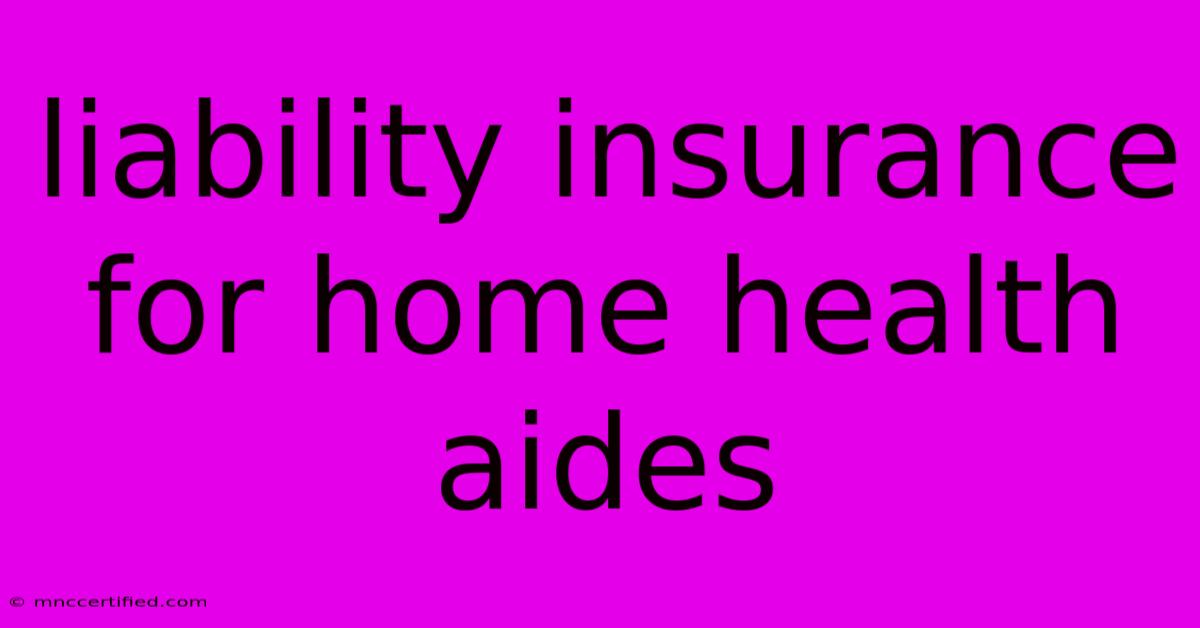Liability Insurance For Home Health Aides

Table of Contents
Protecting Yourself: Why Home Health Aides Need Liability Insurance
As a dedicated home health aide, you provide invaluable care and support to individuals in the comfort of their own homes. But along with the satisfaction of helping others comes the responsibility of protecting yourself from potential risks. This is where liability insurance for home health aides plays a crucial role.
Why is Liability Insurance Essential for Home Health Aides?
While you strive to provide the best care, accidents can happen. Even with the utmost care, unexpected events can arise during your work, potentially leading to:
- Accidents and injuries: A slip and fall, a medication error, or even a minor mishap can result in injuries to the client or their property.
- Negligence claims: If a client or their family member believes you were negligent in your duties, they may file a lawsuit.
- Financial burdens: Medical bills, legal fees, and other costs associated with an accident or lawsuit can be financially devastating.
Liability insurance acts as a safety net, safeguarding you from these potential risks. It provides financial protection, covering legal expenses and settlements in case of a claim.
Key Coverage Components of Home Health Aide Liability Insurance:
1. General Liability Coverage: This protects you from claims arising from bodily injury, property damage, or personal injury, such as slander or libel.
2. Professional Liability Coverage (Errors and Omissions): This specifically covers claims related to your professional services, such as negligence or a failure to provide proper care.
3. Medical Payments Coverage: This covers medical expenses for the client in case of an accident, regardless of fault, up to a specified limit.
4. Legal Defense Costs: This covers legal expenses incurred in defending against a lawsuit, including attorney fees and court costs.
Finding the Right Liability Insurance for Your Needs:
Here's a breakdown of factors to consider when choosing a policy:
- Coverage limits: Determine the maximum amount of coverage you need for each type of claim.
- Premiums: Compare quotes from different insurance providers to find the best value for your budget.
- Exclusions: Carefully review the policy exclusions to understand what isn't covered.
- Reputation and financial stability of the insurer: Choose a reputable provider with a strong track record.
Seeking professional guidance is essential. Consult with an insurance broker specializing in home healthcare to find a policy that meets your specific needs and offers adequate protection.
Beyond Insurance: Protecting Yourself and Your Clients:
In addition to liability insurance, here are other preventive measures to enhance your safety:
- Adherence to professional standards: Maintain up-to-date certifications and follow best practices for providing care.
- Clear communication: Communicate effectively with your clients and their families, documenting any concerns or changes in their condition.
- Risk management practices: Implement strategies to minimize risks, such as proper lifting techniques and maintaining a safe environment.
Conclusion:
Liability insurance for home health aides is a crucial investment that offers vital protection. By ensuring adequate coverage and implementing best practices, you can focus on providing the best possible care while safeguarding yourself from potential risks. Remember, peace of mind is priceless, and liability insurance provides the assurance you need to focus on your clients with confidence.

Thank you for visiting our website wich cover about Liability Insurance For Home Health Aides. We hope the information provided has been useful to you. Feel free to contact us if you have any questions or need further assistance. See you next time and dont miss to bookmark.
Featured Posts
-
Trump Takes Office Inauguration Details
Nov 07, 2024
-
Conversor De Pesos Argentinos A Mexicanos
Nov 07, 2024
-
Badenoch Wants Starmer To Apologize For Lammys Slur
Nov 07, 2024
-
Embedded Vs Non Embedded Health Insurance
Nov 07, 2024
-
Alarming Project 2025 On Birth Control
Nov 07, 2024